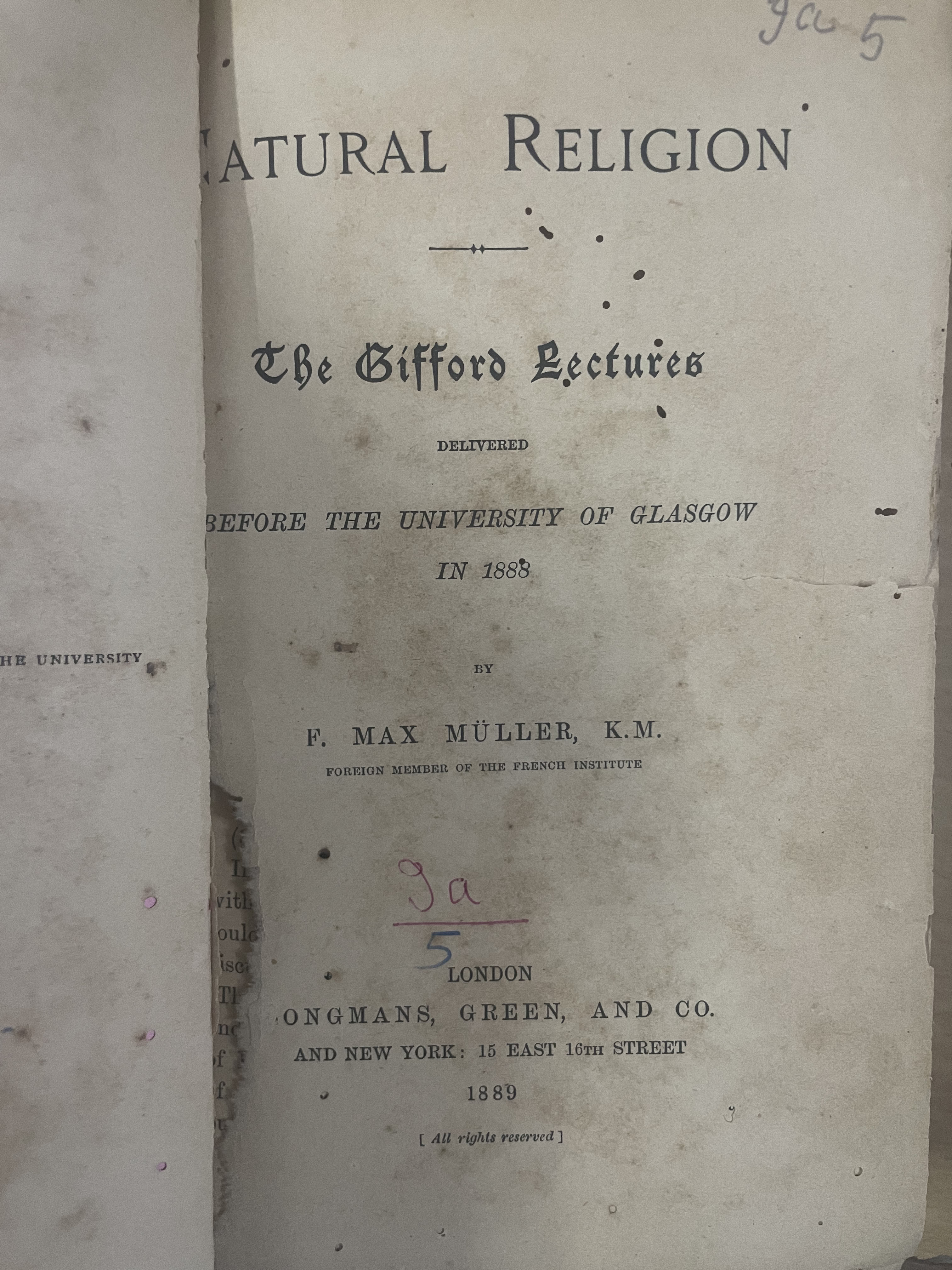Natural Religion The Bifford lectures

About
Summary
Exquisite
TOC
Details
Related
URL
Images
Overview
Natural Religion, a compilation of Gifford Lectures delivered in 1888 by Friedrich Max Müller at the University of Glasgow, explores the origins and development of religious thought. Müller, a German-born British philologist and Orientalist, examines how different cultures have arrived at a belief in the infinite and the divine through their interaction with the natural world.
Importance of Book
Exploration of Natural Religion: Müller's lectures offer an exploration of natural religion, providing insights into the origins and development of religious beliefs across different cultures.
Historical Method: Müller emphasizes the importance of utilizing the historical method to properly understand religious phenomena.
Interdisciplinary Approach: Müller's approach combines philology, mythology, and religious studies to offer a comprehensive understanding of religious thought.
Influence on Religious Studies: Müller's work has had a lasting impact on the field of religious studies, influencing subsequent scholars and shaping the discipline's approach to understanding religion.
Key Themes
Definition of Natural Religion: Müller's primary objective is to define "Natural Religion" in its broadest sense12. He seeks to identify the universal elements of religious experience that arise from humanity's inherent capacity to perceive the infinite within the finite.
Discovery of the Infinite in Nature: Müller traces the historical progression of religious beliefs, illustrating how various nations have developed a sense of the unseen and the divine through their observations of nature. He explores how early humans recognized unseen agents or gods of nature, eventually leading to the concept of a singular God.
Mythology as a "Disease of Language: Müller introduces his influential theory that mythology is a disease of language. He posits that myths arise when abstract concepts are transformed into personified beings and stories. In his view, "gods" began as words representing abstract ideas but evolved into imagined personalities. This concept is rooted in Müller's broader work in comparative philology and his belief in the power of language to shape human thought.
Emphasis on Emotional Communion: Müller's account is colored by Romanticism, particularly its emphasis on emotional communion with natural forces. This perspective shapes his understanding of ancient religions, where he sees the gods as active forces of nature only partially personified as supernatural beings.
Relation of the Soul to God: Müller investigates the relationship between God and the soul, examining the diverse ideas that different cultures have formed concerning this connection. He asserts that true religion is founded on a genuine perception of the relationship between the soul and God, aiming to prove this as a historical fact.
Cultural Significance
Influence of Romanticism: Müller's interpretation of ancient religions is influenced by Romanticism, particularly its emphasis on emotional communion with natural forces.
Comparative Approach: Müller employs a comparative approach, drawing connections between different religious traditions and highlighting universal themes and patterns.
Exploration of Mythology: Müller's theory of mythology as a "disease of language" has had a lasting impact on the study of myth and its relationship to language and culture.
Effects on Society
Accusations of Anti-Christian Sentiment: Müller faced severe criticism for allegedly expressing anti-Christian views in his lectures. Some religious figures accused him of promoting pantheism and undermining the foundations of Christian faith.
Defense of Theistic Evolution: Müller's work was seen as a productive response to the crisis of faith engendered by the historical and critical study of religion and by the Darwinian revolution. He proposed an early, mystical interpretation of theistic evolution, using Darwinism as a critique of mechanical philosophy.
Conclusion
Natural Religion by F. Max Müller offers a complex exploration of the origins and development of religious thought, informed by his expertise in philology, mythology, and religious studies. While the work sparked controversy and criticism, it remains an important contribution to the study of religion and its relationship to language, culture, and human experience.
Table of Content
Natural Religion: The Bifford Lectures is a work by James Martineau, published in 1889. This book comprises a series of lectures that were delivered as part of the Bifford Lectureship at the University of Oxford.Brief Overview:
Title: Natural Religion: The Bifford LecturesAuthor: James MartineauPublication Year: 1889Publisher: Longmans, Green, and Co.Content Overview:
Introduction to Natural Religion:Martineau introduces the concept of natural religion, which is the study of religious beliefs and practices based on reason and observation of the natural world, rather than revealed or traditional religious doctrines.
The Basis of Religious Belief:Discussion on how natural religion is grounded in the understanding of the universe and human nature, focusing on ethics and spirituality derived from natural experience rather than supernatural revelations.
The Moral Argument for Religion:Examination of the moral dimension of natural religion, arguing that ethical principles and a sense of moral duty can be understood through the study of nature and human experience.
The Nature of God:Exploration of the concept of God within the framework of natural religion, considering how divine attributes and the nature of God can be inferred from the natural world.
Religious Experience and Knowledge:Analysis of how religious experiences can be interpreted through natural religion, emphasizing personal and experiential knowledge of the divine.
Comparative Religion:Comparison of natural religion with various religious traditions, highlighting similarities and differences in how different cultures approach the divine and ethical living.
Critique of Revealed Religion:Martineau critiques revealed religions that are based on divine revelations, contrasting them with the principles of natural religion.
Concluding Thoughts:Summary of the key points discussed in the lectures and reflections on the future of natural religion in the context of modern thought.
Title
Natural Religion The Bifford lectures
Author
F Max Muller
Name of Publisher
Longmans Green and Co London
Publish Date
1889
Subject
This book comprises a series of lectures that were delivered as part of the Bifford Lectureship at the University of Oxford.
Vintage
1801-1900
Number of Pages
608
Category
Religion
Sub Category
Literary
Rarity
RARE
